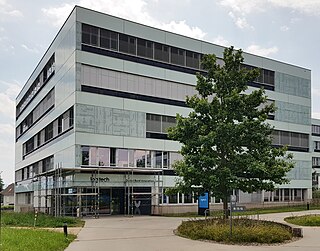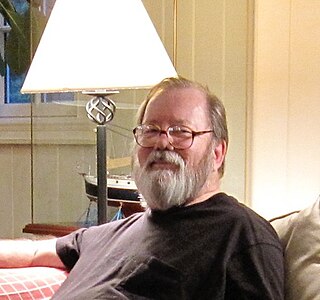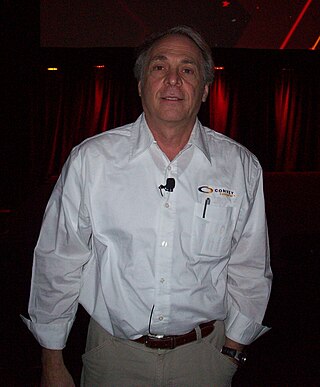Related Research Articles

Digital Equipment Corporation, using the trademark Digital, was a major American company in the computer industry from the 1960s to the 1990s. The company was co-founded by Ken Olsen and Harlan Anderson in 1957. Olsen was president until he was forced to resign in 1992, after the company had gone into precipitous decline.

The Data General Nova is a series of 16-bit minicomputers released by the American company Data General. The Nova family was very popular in the 1970s and ultimately sold tens of thousands of units.

A minicomputer, or colloquially mini, is a type of smaller general-purpose computer developed in the mid-1960s and sold at a much lower price than mainframe and mid-size computers from IBM and its direct competitors. In a 1970 survey, The New York Times suggested a consensus definition of a minicomputer as a machine costing less than US$25,000, with an input-output device such as a teleprinter and at least four thousand words of memory, that is capable of running programs in a higher level language, such as Fortran or BASIC.

Data General Corporation was one of the first minicomputer firms of the late 1960s. Three of the four founders were former employees of Digital Equipment Corporation (DEC).

Craig James Mundie is an American businessperson. In 1982, he co-founded Alliant Computer Systems, becoming CEO. He was later Senior Advisor to the CEO at Microsoft, after being Microsoft's Chief Research and Strategy Officer from 2006 to 2012. He retired from Microsoft in 2014. During the Obama administration, he was a member of his President's Council of Advisors on Science and Technology (PCAST).

John Tracy Kidder is an American writer of nonfiction books. He received the Pulitzer Prize for his The Soul of a New Machine (1981), about the creation of a new computer at Data General Corporation. He has received praise and awards for other works, including his biography of Paul Farmer, a physician and anthropologist, titled Mountains Beyond Mountains (2003).

A superminicomputer, colloquially supermini, is a high-end minicomputer. The term is used to distinguish the emerging 32-bit architecture midrange computers introduced in the mid to late 1970s from the classical 16-bit systems that preceded them. The development of these computers was driven by the need of applications to address larger memory. The term midicomputer had been used earlier to refer to these systems. Virtual memory was often an additional criteria that was considered for inclusion in this class of system. The computational speed of these machines was significantly greater than the 16-bit minicomputers and approached the performance of small mainframe computers. The name has at times been described as a "frivolous" term created by "marketeers" that lacks a specific definition. Describing a class of system has historically been seen as problematic: "In the computer kingdom, taxonomic classification of equipment is more of a black art than a science." There is some disagreement about which systems should be included in this class. The origin of the name is uncertain.

Logitech International S.A. is a Swiss multinational manufacturer of computer peripherals and software. Headquartered in Lausanne, Switzerland and San Jose, California, the company has offices throughout Europe, Asia, Oceania, and the Americas, and is one of the world's leading manufacturers of input and interface devices for personal computers (PCs) and other digital products. It is a component of the flagship Swiss Market Index, and listed on the Nasdaq.
Kenneth Harry Olsen was an American engineer who co-founded Digital Equipment Corporation (DEC) in 1957 with colleague Harlan Anderson and his brother Stan Olsen.

The Soul of a New Machine is a non-fiction book written by Tracy Kidder and published in 1981. It chronicles the experiences of a computer engineering team racing to design a next-generation computer at a blistering pace under tremendous pressure. The machine was launched in 1980 as the Data General Eclipse MV/8000.
Leonard X. Bosack is a co-founder of Cisco Systems, an American-based multinational corporation that designs and sells consumer electronics, networking and communications technology, and services. His net worth is approximately $200 million. He was awarded the Computer Entrepreneur Award in 2009 for co-founding Cisco Systems and pioneering and advancing the commercialization of routing technology and the profound changes this technology enabled in the computer industry.
The PDP-5 was Digital Equipment Corporation's first 12-bit computer, introduced in 1963.

Joseph Thomas West III was an American technologist. West is notable for being the key figure in the Pulitzer Prize winning non-fiction book The Soul of a New Machine.

The Data General Eclipse line of computers by Data General were 16-bit minicomputers released in early 1974 and sold until 1988. The Eclipse was based on many of the same concepts as the Data General Nova, but included support for virtual memory and multitasking more suitable to the small office than the lab. It was also packaged differently for this reason, in a floor-standing case the size of a small refrigerator. The Eclipse series was supplanted by the 32-bit Data General Eclipse MV/8000 in 1980.
Robert B. Palmer is an American businessman in the computer industry.

Steven "Steve" J. Wallach is an engineer, consultant and technology manager. He is a Seymour Cray Computer Engineering Award recipient.
Varian Associates was one of the first high-tech companies in Silicon Valley. It was founded in 1948 by Russell H. and Sigurd F. Varian, William Webster Hansen, and Edward Ginzton to sell the klystron, the first vacuum tube which could amplify electromagnetic waves at microwave frequencies, and other electromagnetic equipment. Varian Associates split into three companies in 1999: Varian Medical Systems, Varian, Inc. and Varian Semiconductor.
Condusiv Technologies is an American software company based in Burbank, California. The company was formerly known as Diskeeper Corporation, a name derived from its flagship product, Diskeeper, a file-system defragmentation software package for Microsoft Windows and OpenVMS. Before adopting the Diskeeper name, the company was known as Executive Software International, Inc.
The Talking Propellerheads was a high technology satire/rock/comedy band performing from 1982 through 1996. The group was composed of employees of Data General Corporation. They were notable as the "corporate band" for Data General for over 14 years, playing at industry events and company functions. Their songs documented the fall of the minicomputer industry of the 1980s with their songs about Wang, DEC, Prime, IBM and other companies. Their songs reported on changes in the minicomputer industry such as An Wang's retirement, as well as documenting some of the players that formed the industry: Data General founders.

The biographical book, The ultimate entrepreneur: the story of Ken Olsen and Digital Equipment Corporation, chronicles the experiences of Ken Olsen racing to design minicomputers at the company of his own founding, Digital Equipment Corporation. At the time the book was published by two computer journal writers, Ken Olsen was competing with other Massachusetts computing companies such as Data General, Prime Computer, Wang Laboratories, Symbolics, Lotus Development Corporation, and Apollo Computer. While believing in the value of software, he did not believe in the value of software separate from hardware, and missed the opportunity to fund Lotus 1-2-3 or Visicalc. He also missed the importance of the personal computer, but his futuristic vision of the Client–server model helped to launch Ethernet.
References
- ↑ "Oral History of Edson (Ed) D. de Castro" (PDF). Computer History Museum.
- ↑ "Data General NOVA (1969)". Archived from the original on 2001-08-12. Retrieved 2010-06-27.
- 1 2 Hyatt, Joshua (April 1, 2003). "The Business That Time Forgot Data General is gone. But does that make its founder a failure?". money.cnn.com. Retrieved 2022-05-29.
- ↑ "DeCastro v. DeCastro". Justia Law. Retrieved 13 February 2021.